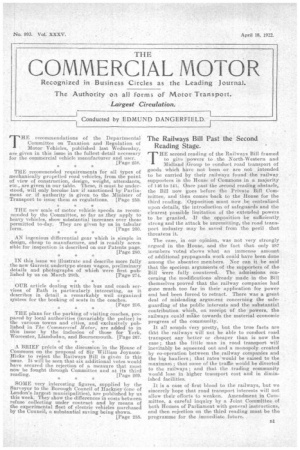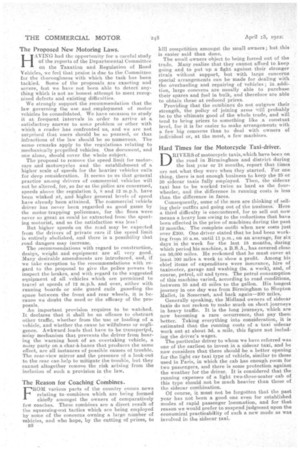The Railways Bill Past the Second Reading Stage.
Page 1

Page 2

If you've noticed an error in this article please click here to report it so we can fix it.
HE second reading of the, Railways Bill framed to give powers to . the North-Western and
Midland Group to conduct road transport of goods which have not been or are not intended to be carried by their railways found the railway supporters in the House of COMM/OTIS in a majority of 146 to 141. Once past the second reading obstacle, the Bill now goes before the Private Bill Committee, and then comes back to the House for the third reading. Opposition must now be centralized -upon details, the introduction of safeguards and the clearest possible limitation of the extended powers to be granted. if the opposition be sufficiently strong and the attack be unremitting, the road transport industry may be saved from the peril that threatens it.
The case, in our opinion, was not very strongly argued in the House, and the fact that only 287 members voted shows vhat an immense amount of additional prppa.ganda work could have been done among the absentee members. Nor can it be said that the specious arguments of the supporters of the Bill were fully countered. The admissions concerning the modifications already made in the Bill themselves proved that the railway companies had gone much. too far in their application for power and had been forced to retract. There was a great deal of misleading argument concerning the safeguarding of the public interests and the substantial contribution which, on receipt of the powers, the railways could make towards the material economic progress of the community.
It all sounds very pretty, but the true facts are thItt the railways will not be able to conduct road transport any better or cheaper than is now the case;, that. the little man in road transport will inevitably be squeezed out and a monopoly created by co-operation between the railway companies and the big hauliers; that rates 'would be .raised to the maximum ; that some of the traffic would be diverted to the railways ; and that the trading community would lose in higher transport cost and in diminished facilities.
It is a case of first blood to the railways, but we sincerely •hope that road transport interests will not allow their efforts to weaken. Amendment in Coinmittee, a careful inquiry by a Joint Committee of both Houses of Parliament with general insttuctions, and then rejection on the third reading must be the programme for the immediate future.
THE COMMERCIAL MOTOR The Proposed New Motoring Laws.
HAXING had the opportunity for a careful study of the reports of the Departmental Committee . on the Taxation and Regulation of Road Vehicles, we feel that praise is due to the Committee for the thoroughness with which the task has been tackled. Some of the proposals are exacting and severe, but we have not been able to detect anything which is not an.honest attempt to meet recognized defects and existing difficulties.
We strongly support the recommendation that the law governing the use and .employment of motor vehicles be consolidated. We have occasion to study it at frequent intervals in order to arrive at a satisfactory answer to some problem or other with which a reader has confronted us, and we are not surprised that users should be so puzzled, or that infractions of the law should be so numerous. The same remarks apply to the regulations relating to mechanically propelled vehicles. One document, and one alone, should cover the whole subject.
The proposal to remove the speed limit for motorcars and motorcycles and the establishment of a higher scale of speeds for the heavier vehicles calls for deep consideration. It seems to us that general practice among drivers of commercial, vehicles will not be altered, for, so far as the Pisliee are concerned, speeds above the regulation 5, 8 and 12 m.p.h. have been winked at, and higher general levels of speed have already been attained. The commercial vehicle driver has never been regarded as goad game by the motor-trapping policeman, for the fines were never se great as could be extracted from the sporting motorist, and so the satisfaction was less !
But higher speeds on the road may be expected from the drivers of private cars if the speed limit is entirely abolished, and there is a possibility that road dangers may increase. .. • The recommendations with regard to construction, design, weight and equipment are all very good. Many desirable amendments are introduced, and, if we take exception to the recommendations with regard to the proposal to give the police powers to inspect the brakes, and with regard to the suggested equipment of all vehicles which are permitted to travel at speeds of 12 m.p.h. and over, either with running 'boards or side guard Tails guarding the space between the front and rear wheels, it is because we doubt the need or the efficacy of the proposals.
An important provision requires to be watched. It declares that it shall be an offence to obstruct other traffic, whether from the use Or loading of a vehicle, and whether the cause 'be wilfulness or negligence. Awkward loads that have to be transported, noisy mechanism that prevents the driver from hearing the -warning hoot of an overtaking vehicle, a noisy party on a chara-bancs that produces the same effect, are all instances of possible causes of trouble. The rear-view mirror and the presence of a look-out to the rear can help to mitigate the trouble, but they cannot altogether remove the risk arising from the inclusion of such a provision in the law.
The Reason for Coaching Combines.
FROM various parts of the country comes news relating to combines which are being formed chiefly amongst the owners of comparatively few coaches. These combines are a direct result of the squeezing-out tactics which are being employed by some of the concerns owning a large number of vehicles, and who hope, by the cutting of prices, to
B2 kill competition amongst the small owners; but this is easier said than done. • The small owners object to being forced out of the trade. Many realize that they cannot afford to keep going and to put up a fight against their stronger rivals without support, but with large concerns special arrangements can be made for dealing with the overhauling and repairing of vehicles ; in addition, large concerns are usually able to purchase their spares and fuel in bulk, and therefore are able to obtain these at reduced prices. Providing that the combines do not outgrow their strength, the policy of joining arms will probably be to the ultimate good of the whole trade, and will tend to bring prices to something like a constant level, for it is far easier to make arrangements with a few big concerns than to deal with owners of individual or, at the most, a few machines.
Hard Times for the Motorcycle Taxi-driver.
DRIVERS of motorcycle taxis, which have been on the road in Birmingham and district during the last year or 18 months, report that times arc not what they were when they started. For one thing, there is not enough business to keep the 25 or 30 sidecar taxis fully employed. Then, the sidecar taxi has to be worked twice as hard as the fourwheeler, and the difference in running costs is less than the difference in fares.
Consequently, some of the men are thinking of selling their outfits and going out of the business: Here a third difficulty is -enco-untered, for to sell out now means a heavy loss owing to the reductions that have been effected in the price of machines during the past 12 months: The complete outfit when new costs just over £300. One driver stated that he had been working from 10 a.m. until 11.p.m., on an average, for six days in the week for the last 18 months, during which period his machine, a B.S.A., has covered close on 50,000 miles. He reckoned that he must cover at least 300 miles a week to show a profit. Among his chief items of expenditure were insurance, hire of taximeter, garage and washing (5s. a week), and, of course, petrol, oil and tyres. The petrol consumption of this machine varied, according to road conditions, between 35 and 45 miles to the gallon. His longest journey in one day was from Birmingham to Shepton Mallet, in Somerset, and back again-200 miles.
Generally speaking, the Midland owners of sidecar taxis do not reckon to make much on short journeys in heavy traffic. It is the long journeys, 'which are now becoming a rare occurrence, that pay them better. Taking everything into consideration, it is estimated that the running costs of a taxi sidecar work out at about 3d. a mile, this figure not including the driver's wages. The particular driver to whom we have referred was one of the earliest to invest in a sidecar taxi, and he now considers that there should be a better opening for the light car taxi type of vehicle, similar to those used in Paris, in which the cab has enough room for two passengers, and there is some protection against the weather for the driver. It is considered that the running expenses of a light two-three-seater cab of this type should. not be much heavier than those of the sidecar combination.
Of course, it must not be forgotten that the past year has not been a good one even for established modes of rapid passenger locomotion, and for that reason we would prefer to suspend judgment upon the economical practicability of such a new mode as was involved in the sidecar taxi.


































